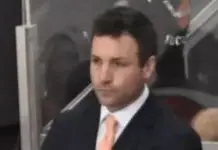Another year, another champion.
While college hockey’s fraternity of teams is a select few compared to many other NCAA sports, the task of repeating as champion is among the most difficult.

With Maine’s semifinal loss to North Dakota, another chance for it to happen — for the first time in 28 years — went by the boards. In fact, in only three of the last 25 years has a team returned to the final game the season following a championship, the last coming in 1993 when defending champion Lake Superior was eliminated by the heroics of Maine’s Jim Montgomery.
We don’t yet know who the first champion of the new millennium will be, but it won’t be Maine.
Part of the problem with repeating is that, inevitably, every year, every other team is gunning for you. Then, also inevitably, if a team gets close to repeating, the media asks them about it, and players are forced to talk about how badly they want to do it.
“Maine was talking about repeating, and that gave the guys even more motivation,” said North Dakota coach Dean Blais after the Sioux won Thursday, 2-0.
But as Maine senior Ben Guite pointed out, players are savvy enough these days not to slight their opponents, who will hang their hats on any possible comment.
“It’s hard not to think of it because we want it, we want to win it all,” said Guite. “When you only have two games left to that goal, one of the ways to put it is to say we want to win it. But in no way does that take away from North Dakota. It’s just something we want to accomplish.”
Wisconsin is certainly one team that’s been in position to repeat, most recently in 1991, only to come up short.
“The psychological part of things at this time of the year is big,” said Wisconsin coach Jeff Sauer. “The teams are pretty even, so every little thing that goes on matters. North Dakota, I think, had a better team last year. But they lost, so this year, they’re coming in more hungry. Maine won [last year], so maybe they’re not as hungry.”
“I don’t think it’s something as a team we talked about,” said Maine senior Jim Leger. “It’s something that fans talked about it. Whatever fuels [North Dakota], that’s their business, but we didn’t look at it like that. It just didn’t work out.
Maine coach Shawn Walsh, however, downplayed any idea of pre-game repeat chatter as motivation for the Sioux Thursday afternoon.
“I don’t think any talk was any factor in the game,” Walsh said. “Early in the year, it’s a factor. For some teams, it makes their seasons to beat you. Their student body shows up. But that’s good, because it makes you tougher.”
Walsh says the biggest difficulty to winning back-to-back titles is simply the difficulty in winning a title at all. One championship is hard enough, so purely by odds, winning two has to be extremely difficult.
“The No. 1 reason is parity: it’s having [just] 18 scholarships,” said Walsh. “It’s a buyer’s market. There’s so many players, even though a Maine or North Dakota can get good players, there’s so many other good players, and it’s become even more so with expansion into Europe and teams recruiting in Western Canada — even Eastern teams — there’s so many players, you can stock a pretty good club.
“And the coaching in college hockey has improved dramatically. And you don’t have the firings you have in the NHL, so you have a real consistency there.”
Nonetheless, seniors like Leger leave school with something most players never get: one championship.
“In this day and age with the parity, it’s definitely harder,” said Leger. “It’s going to take a lot. But we made a good run at it.”


